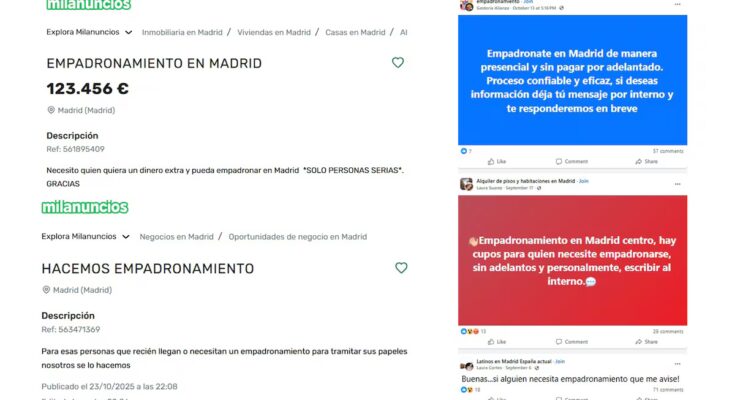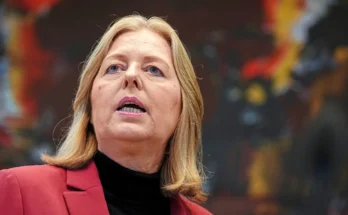Recording in Madrid has become a profitable business. It costs between 50 and 300 euros. The ads are very clear, but they offer an illegal service. “Register in person in Madrid and without paying in advance. Reliable and efficient. Leave your message”; “Registration in the center of Madrid, there are places for those who need to register”; “Hi, if anyone needs to register, please let them know.” These are some of the first messages that you read among dozens when you type “registration Madrid” on social networks like Facebook. The procedure, if carried out officially, is completely free, which is why desperate people who feel the need to formalize their situation in the capital: foreigners, often fall into the trap of paying.
There are dozens of examples. Alejandro Martínez, 28, recalls that he and his wife paid 200 euros to register in Madrid as soon as they arrived, while temporarily living in an Airbnb. “We did it just to start the residency processes,” he explains. The practice was managed by a friend’s wife, who acted as manager and made the appointment with the person who would register them. “The first time they sent us back because they no longer allowed people to register on that floor; they were still registered even if they no longer lived there,” he says. In the end they did it. “I don’t recommend it, you’re dependent on the person to notify you if some communication comes in, and I was worried about the illegality of the situation, that the whole process might fall apart because of this,” he adds. At the other extreme is Daniela C., who rents rooms in the center of Madrid with a contract and a clause that forces you to pay 100 euros more if you want to register. This is also illegal. But he’s not the only one doing it. Through WhatsApp Daniela offers two options: registration only, 100 euros, or the room with extra documents, 500, depending on the customer’s needs.
It was thus, with an announcement on Facebook, that Mateo Salcedo contacted the person who registered him in an apartment located in Atocha street, in the heart of Madrid. This 28-year-old Colombian arrived in the capital with his partner and his dog, named Chihuahua Andy―. Added to the difficulty of finding the registration was that of finding a room that would accept a couple with a pet. They arrived in October 2024 in an apartment in Hortaleza and had only 90 days to regularize. Salcedo takes a break from his work at a local Mercado de Vallehermoso, takes off his gloves after preparing a plate of cod carpaccio, and recalls how he began the process: “I went on Facebook and started searching for the word padrón.” The offer of advertisements was large and he wrote to several people offering memberships, who introduced themselves as alleged operators.
Although registration is a free process, Salcedo’s owner did not provide him with any of the documents needed to do so legally. Furthermore, according to what the person who rented the apartment to him told him, he was unable to register it due to “a bureaucratic problem”. The Municipality of Madrid specifies that, to register, all you need is the contract signed by the owner of the home and proof of payment of the rent. You can also present the title deed or the water or gas bill. The Consistory specifies that every person living in Spain, whether Spanish or foreign, “is obliged to register in the registry office of the municipality in which he habitually resides, regardless of whether or not he has regularized his administrative situation in Spain”. However, ignorance or the fact that there are owners who do not provide these documents, causes those who cannot register to turn to the black market.
Once the first contact has been established with the alleged abusive managers, who also monopolize registration appointments in town halls, interested parties receive a pre-arranged message via WhatsApp with the conditions. In the case of a profile called Gestoría Alianza, the cost is 160 euros to register somewhere in the Ciudad Lineal district. It’s not the most expensive.
— Hi, I need registration in Madrid.
— Thank you for communicating with us. The registration process has the following characteristics: appointment scheduling, in-person processing, no money advance, cash payment when leaving the Municipality after receiving the certificate, free consultation on other procedures if you need it.
-How much does it cost?
—The value of the service is 160 euros per person and is valid for two years. We can meet tomorrow at the town hall.
—What should I bring?
— Only the document you wish to be registered with.
This conversation pattern is repeated with all alleged managers. Salcedo was summoned by the person he contacted. He arrived punctually at a Municipality office and filled out the registration form together with another man, also a foreigner and, according to the information they provided, his roommate. Before entering, the alleged manager gave them instructions on what to answer in case of questions, a sort of tutorial to avoid arousing suspicion. But the plan didn’t work. The city hall clerk denied them the registry office. Salcedo recalls the motivation he gave them: “If you really live there, call the police. Because there are more than 70 people registered in the system.”
The first attempt didn’t work, but the black market for recordings soon revealed another option. Salcedo received the response from another of the Facebook profiles to which he had written. They charged him 150 euros. On the second attempt everything was faster and simpler: the alleged perpetrator made an appointment at another office, he himself filled out the registration form with the data of two other foreigners who showed up for the same appointment. Within a few minutes he already had the register in his hands. Shortly after, although with another operator, the couple from Salcedo also had to pay to register. They asked her for 80 euros, but discharged her after eight months.
A necessary and free procedure has become an obstacle for immigrants who urgently need a document that proves their roots, allows them to send their children to school, go to the medical center and start getting their documents in order. Their desperation is the basis of a clandestine and illegal business for those who seek to make money at the expense of other people’s needs and administrative traffic jams.
This traffic jam originates from something as simple as the fact that the number of people wanting to register “has increased significantly in the last year,” explains Mayte Zabalza, spokesperson for Padrón por Derechos.
In Madrid, as of January 1, there were 3,527,924 registered residents, according to the Economy Area of the Municipality of Madrid. In the last year alone, 67,433 more people signed up. “The Municipality of Madrid is carrying out the registration procedures in the utmost normality, as long as the applicants satisfy the requirements established by the regulation”, assures the Municipality. However, dozens of Madridians complain about the lack of available appointments.
The problem is so serious that currently more than 800 people are registered, for example, in the social centers of the Lavapiés neighborhood, such as the Bangla community. Two months ago, the judicial system annulled the Almeida government’s decree that prevented registration in these centers. The sentence indicates that “the trial process was omitted, violating rights and freedoms susceptible to constitutional protection” and condemns the Municipality to pay the costs.
However, according to the City Council, they themselves facilitate this management for people in vulnerable situations, such as migrants or the homeless. In the two municipal offices of Information, Orientation and Support for the Social Integration of the Immigrant Population, advice is offered for carrying out the procedure, and the professionals of the programs and reception centers also support those living on the streets. Since 2022, more than 3,800 people have registered in the city through this mechanism. In 2024, the last full year, 1,330 people were registered this way.
Immigration lawyer Mariana Ríos, director of the consultancy ExtranLex, explains that registration is the procedure through which a person communicates to the Municipality the place where they usually reside. Although it may seem like a simple administrative obligation, this registration is of fundamental importance for all citizens, especially for foreigners living in Spain.
“For many foreigners, registration is not an easy task. Those who rent rooms or share an apartment usually encounter reluctance from owners to allow them to register in their home. Sometimes, even the municipalities themselves refuse registration in houses where numerous people already live, although it is true that in recent years this policy has become more flexible,” says Ríos. The lawyer emphasizes that registration is much more than a bureaucratic formality: it is the key to access fundamental rights, an indicator of social integration and, at the same time, a field in which the needs, regulations and social reality of thousands of people trying to build their lives in Spain converge.



